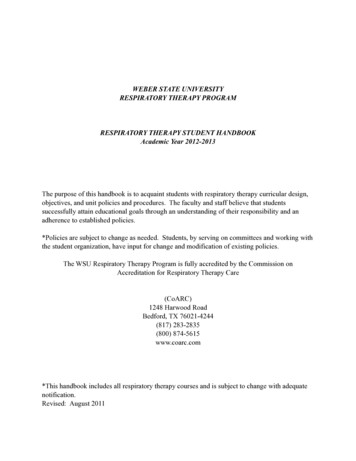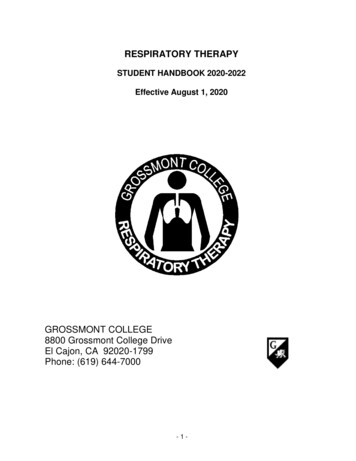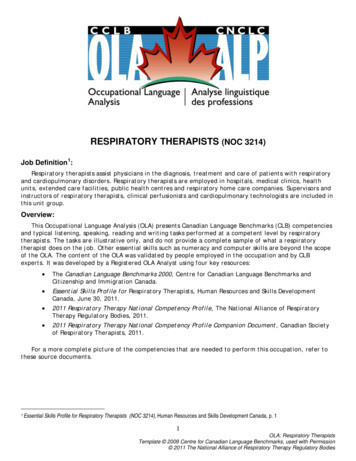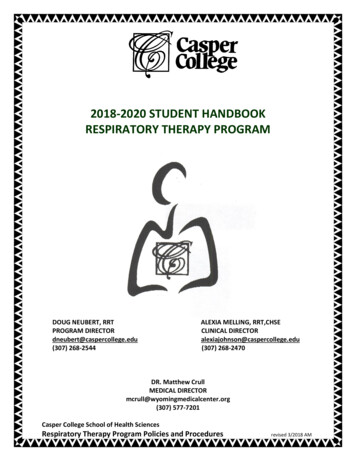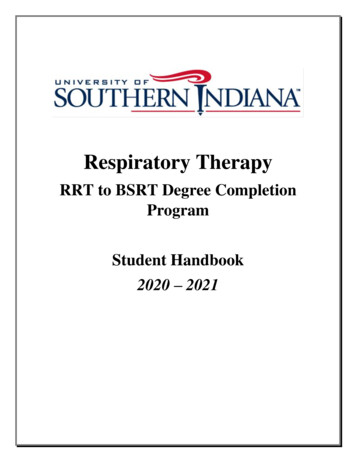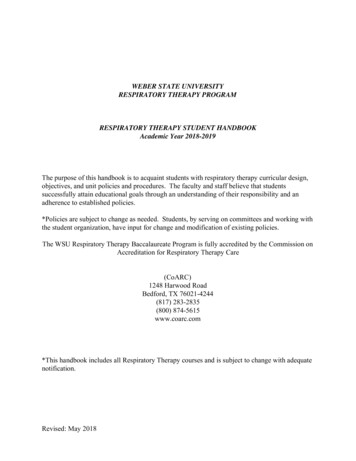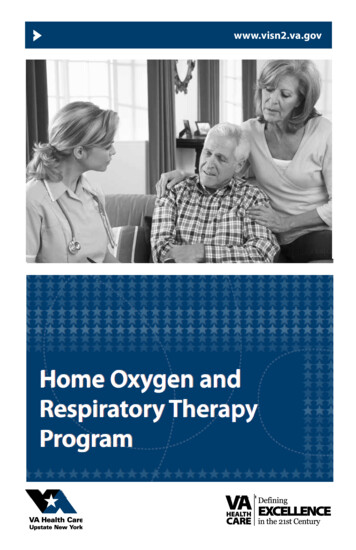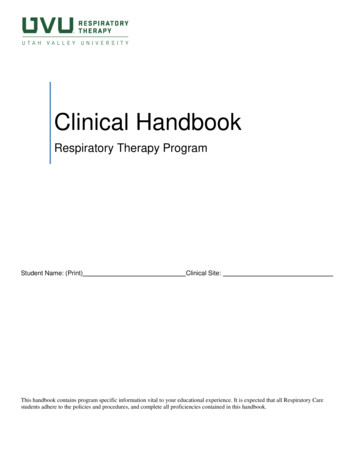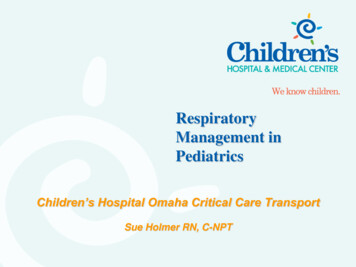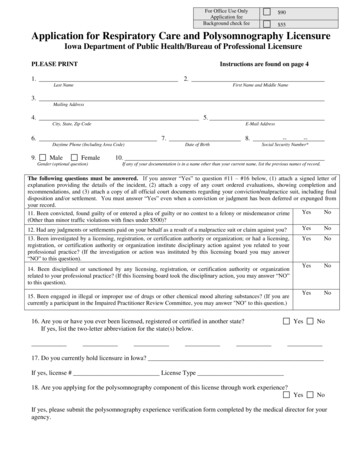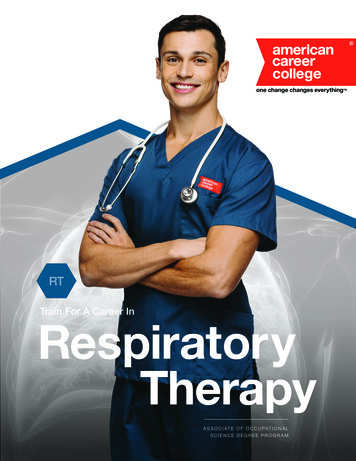
Transcription
one change changes everythingTMRTTrain For A Career InRespiratoryTherapyA S S O C I AT E O F O C C U PAT I O N A LSCIENCE DEGREE PROGR AMM A K E A C H A N G E T O D A Y / For more information visit americancareercollege.edu
We all dream of success.Our goal is to help you achieve it.Meet American Career CollegeWith over 40 years of experience in healthcare training and more than 50,000 alumniin California, ACC is here to help you make your goals a reality.Our classes are modeled after real-life scenarios, using the same medical tools andequipment you’ll use on the job. That way, you’re prepared to jump in on your veryfirst day. We provide education focused on real-world skills and knowledge, giving ourstudents the opportunity to change their lives for the better.What is a Respiratory Therapist?Respiratory therapists treat and care for patients with breathing or other cardiopulmonarydisorders. Their job can include tasks such as treating patients using oxygen or aerosolmedications, placing oxygen masks or nasal cannulas, and adjusting the equipmentas needed.1Respiratory therapists can work in a variety of settings, including hospitals, outpatientcare centers, and nursing care facilities.1Program OverviewACC’s Respiratory Therapy program aims to prepare you with both the skills andknowledge to work with patients who have cardiopulmonary disorders.RespiratoryTherapist SkillsetMonitorVitalSignsObserve patients’ responsesto therapy and communicatechanges with physicians.ManageEquipmentUnderstand how to operateand teach others to usemedical devices.PatientCareLearn to provide emergency careincluding conducting examinationsand diagnostic tests.1 etail.aspx?Soccode 291126&Geography 0601000000M A K E A C H A N G E T O D A Y / For more information visit americancareercollege.edu
Respiratory Therapy ProgramThe Respiratory Therapy program is divided into eight 10-week quarters consisting of general education, anatomy andphysiology, core respiratory therapy, and clinical practicum courses. Starting in the sixth quarter, students begin their clinicalrotations and complete a total of 720 hours.General Education Courses:ANAT105 Clock Hours 60 Quarter Credits 6ENGL100 Clock Hours 40 Quarter Credits 4MATH110 Clock Hours 40 Quarter Credits 4Introduction to Anatomy and PhysiologyWritten Communications I*College Mathematics IThe purpose of this course is to understand theorganization and general plan of the body and theimportance of how the human body functions. Thisincludes an introduction to the human body, chemicalaspects of the life, cells, tissues, membranes, and theintegumentary, skeletal, muscular, nervous, endocrine,cardiovascular, lymphatic, respiratory, digestive, urinary,and reproductive systems.This course provides instruction in the process ofeffective written communication for a variety of formats.It initially focuses on four basic areas of effective writing:unity, specifics, coherence, and grammar. The coursewill utilize reading, discussion, and personal insight toincrease students’ capacity to write simple paragraphs,formal essays, reports, and research projects. Studentswill be equipped with techniques that facilitate creative,academic, and professional written communication.Additionally, students will be given library activities toenhance research skills.This course will cover mathematical logic, Booleanalgebra, set theory, number abstractions, operationsand their properties, monomials, polynomials,equations, and inequalities.PSYC100 Clock Hours 40 Quarter Credits 4Introduction to Psychology*This course provides basic psychological conceptssuch as, the nervous system, memory, intelligence, anddevelopment along with Freudian, humanistic, social,cognitive, and trait theories.*Courses delivered in a blended format, a combination of online and groundR E S P I R AT O RY T H E R A P Y / A S S O C I AT E O F O C C U PAT I O N A L S C I E N C E D E G R E E P R O G R A M
Core Respiratory Therapy and Other Courses:CAREER100 Clock Hours 20 Quarter Credits 1Career Advantage*Career Advantage is a course designed to preparestudents to develop career planning and job searchskills. Thorough, relevant job search preparation isrequired to compete successfully for jobs in today’smarket. To prepare the student, the course will addresssix areas: resumes, job search process, networkingtechniques in a job search, interview planning andpreparation, communication, and workplace skills.RCP100 Clock Hours 30 Quarter Credits 3Introduction to Respiratory ScienceThis course introduces students to applications of basicphysics concepts relative to the field of respiratorytherapy including mechanics of motion, work andenergy, states of matter, gas laws, gas behavior, andfluid dynamics. Additionally, this course will introducestudents to concepts related to the properties andgeneration of humidity and aerosols, manufacture,storage, handling, transport of medical gases and thedesign of devices to regulate and deliver medical gases.RCP100-L Clock Hours 20 Quarter Credits 1Introduction to Respiratory Science LabThis laboratory course introduces students toexperimentation with and application of basic physicsconcepts relative to the field of respiratory therapyincluding mechanics of motion, work and energy, statesof matter, gas laws, gas behavior, and fluid dynamics.Additionally, this course will introduce students toconcepts related to the properties and generationof humidity and aerosols, safe and proper selection,assembly, troubleshooting, handling and transport ofmedical gases as well as devices to regulate and delivermedical gases.RCP200 Clock Hours 40 Quarter Credits 4Cardiopulmonary Anatomy and PhysiologyThis course is a focused study of cardiopulmonaryanatomy & physiology. Discussions will center on asystematic understanding of the position, functionand interplay of structures within the respiratory,cardiovascular and renal systems as well as controlof breathing, gas exchange, acid-base physiology,cardiac electrophysiology, and fluid balance. Includedin this course will be interpretation of clinica l laboratoryfindings, proper techniques for conducting patientassessment, and documentation of the resultantclinical findings.RCP250 Clock Hours 30 Quarter Credits 3Respiratory Procedures IThis course introduces students to basic respiratorycare treatments and support modalities; set-up, useand troubleshooting of equipment; concepts relatedto the therapeutic administration of oxygen andaerosol therapy in respiratory care; and concepts andtechniques surrounding sampling and proper handlingand transport of arterial blood gases. Focus is placedon adherence to techniques ensuring appropriateinfection control practices and patient safety. Studentswill learn to conduct physical and clinical examsand patient assessments to determine and developappropriate and effective treatment plans.RCP250-L Clock Hours 20 Quarter Credits 1Respiratory Procedures I LabThis laboratory course introduces students tothe application of non-invasive respiratory caretreatments and support modalities, set-up, use, andtroubleshooting required equipment.RCP300 Clock Hours 30 Quarter Credits 3Respiratory PharmacologyThis course introduces students to the study ofpharmacological principles related to the treatment ofpatients with cardiopulmonary disease. The courseincludes a study of the anatomy and basic functionof the central and peripheral nervous systems,principles of drug action, the basic methods of drugadministration, standard drug calculations, and theeffects of drugs on particular body systems. Inhaledbronco-active aerosols and other agents commonlyemployed in the care of the cardiopulmonary patientare discussed.RCP370 Clock Hours 40 Quarter Credits 4Adult Cardiopulmonary Pathophysiology IThis course begins with a study of the fundamentaltechniques and protocols required to conduct athorough patient assessment. Included in this course isa discussion on the various non-invasive and invasivetests that are involved in determining the presenceof various cardiopulmonary diseases and disorders.Etiology, clinical signs and symptoms, diagnosis,management and prognosis of acute and chronicpulmonary diseases will be the major emphasis ofthis course.RCP330 Clock Hours 40 Quarter Credits 4Respiratory Procedures IIThis course is a continuation of Respiratory ProceduresI and introduces students to advanced respiratory caretreatments and support modalities, set-up, use, andtroubleshooting required equipment, and the RT’s rolein performing and assisting with special procedures.Focus is placed on achieving understanding of theapplication of specific modalities to clinical scenarios,assessing effectiveness of treatment, modification oftreatment based on clinical indication, and patientresponse and operating principles of equipment used.RCP330-L Clock Hours 20 Quarter Credits 1Respiratory Procedures II LabThis laboratory course introduces students to set-up,use, and troubleshooting of required equipment, andthe RT’s role in performing and assisting with specialprocedures.RCP450 Clock Hours 30 Quarter Credits 3Cardiopulmonary Diagnostic Testing andPulmonary RehabilitationThis course is a study of pulmonary diagnostictesting techniques and interpretation for proceduresoccurring in the PFT laboratory, at the bedside, specialprocedures imaging departments, pathology, andclinical laboratory departments. An emphasis will beplaced on how information from various diagnostictests and studies (such as pulmonary function testingand clinical lab findings) are used to determine thepresence, extent, and progression of lung disease andabnormality and also how these findings are utilized todevelop an ongoing plan of care for the patient.RCP450-L Clock Hours 20 Quarter Credits 1Cardiopulmonary Diagnostic Testing andPulmonary Rehabilitation LabThis laboratory course introduces students topulmonary diagnostic testing techniques andinterpretation for procedures occurring in the PFTlaboratory and at the bedside.RCP470 Clock Hours 40 Quarter Credits 4Adult Cardiopulmonary Pathophysiology IIThis course begins with a study of the fundamentaltechniques and protocols required to conduct athorough patient assessment. Included in this course isa discussion on the various non-invasive and invasivetests that are involved in determining the presenceof various cardio-pulmonary diseases and disorders.Etiology, clinical signs and symptoms, diagnosis,management and prognosis of acute and chronicpulmonary diseases will be the major emphasis ofthis course.
RCP500 Clock Hours 60 Quarter Credits 6Mechanical Ventilation IThis course is a study of the basic principles ofmechanical ventilation, the effects of positive pressureventilation, and classification of mechanical ventilators.Conventional modes of ventilation are compared andcontrasted with attention to waveform analysis withinthese modes. A case study approach is utilized todiscuss concepts of initiation of mechanical ventilation,appropriate ventilator management, weaning criteria,determination of appropriateness to wean, and clinicalapplication of pharmacotherapy for the mechanicallyventilated patient. Non-invasive positive pressureventilation is also addressed.RCP500-L RCP600-L Clock Hours 20 Quarter Credits 1Neonatal/Pediatric CardiopulmonaryPathophysiology LabThis course is a study of fetal development of thecardiopulmonary system, respiratory care of neonataland pediatric patients, as well as causes andtreatment of respiratory illnesses. Students will gain anunderstanding of patient evaluation, monitoring andtherapeutic modalities seen with common neonataland pediatric disorders, including respiratory distresssyndrome, intracranial hemorrhage, pulmonaryhypertension of the newborn, common respiratoryinfections in the infant and pediatric population andpediatric trauma.Clock Hours 20 Quarter Credits 1Mechanical Ventilation I LabThis laboratory course introduces students to thebasic principles of mechanical ventilation (both invasiveand non-invasive), selection, assembly and testingof the equipment. Additionally, students will practicedetermining initial ventilator settings, clinical applicationof pharmacotherapy, assessing appropriateness towean, and discontinuation of mechanical ventilation.RCP550 Clock Hours 40 Quarter Credits 4Introduction to Clinical PracticumThis course prepares students to begin training in theclinical environment. Topics in this course will includeprofessional ethics and communication skills forstudents; orientation to charting techniques; HIPAAtraining; and the Joint Commission topics related topatient safety initiatives and professionalism in thehealthcare environment. Focus is also placed onissues surrounding universal precautions, blood-bornpathogen safety, infection control, dealing with deathand dying, and diverse populations. During this courseall students will complete pre-clinical health exams,immunizations, TB and drug screenings. Additionally,each student will receive certification in AmericanHeart Association healthcare provider CPR and FireSafety Training.RCP600 Clock Hours 40 Quarter Credits 4Neonatal/Pediatric CardiopulmonaryPathophysiologyThis course is a study of fetal development of thecardiopulmonary system, respiratory care of neonataland pediatric patients, as well as causes andtreatment of respiratory illnesses. Students will gain anunderstanding of patient evaluation, monitoring, andtherapeutic modalities seen with common neonataland pediatric disorders, including respiratory distresssyndrome, intracranial hemorrhage, pulmonaryhypertension of the newborn, common respiratoryinfections in the infant and pediatric population, andpediatric trauma.RCP700 Clock Hours 60 Quarter Credits 6Advanced ConceptsThis course is a study of information gatheringtechniques, critical decision-making processes, clinicalcase applications and development of cardiopulmonarycare plans. An emphasis will be placed on interpretationof clinical lab findings, imaging, pulmonaryfunction testing, management of cadiopulmonarypathophysiology, and application of advancedcardiopulmonary therapies.RTCP210 Clock Hours 240 Quarter Credits 8Clinical Practicum IThis course is an introduction to the clinicalenvironment and begins with an orientation to thehospital/respiratory department in policies, procedures,equipment storage location, and handling. Students willgain hands-on experience in infection control policy andprocedures, selection and assembly of basic respiratorycare equipment for the purposes of administeringoxygen therapy, humidity and aerosol therapy, andbronchoactive aerosol therapy. Emphasis will be placedon developing skills of patient assessment, observation,modification of therapy, development of patient careplans, and documentation to the patient care record.Students will gain competency in the areas of noninvasive pulmonary hygiene, lung expansion therapy,and airway clearance techniques. The student will alsodevelop skills in patient/family education on a varietyof therapies and topics in respiratory care. During thispracticum, students will complete chart reviews in orderto demonstrate familiarity with locating and collectingpatient data from the medical record. Students willalso present a case study in order to demonstrate theintegration of didactic theory with clinical skills.RTCP212 Clock Hours 240 Quarter Credits 8Clinical Practicum IIThis course is a continuation of the clinical experiencefrom RTCP210 and begins with an orientation to thehospital/respiratory department in policies, procedures,equipment storage location, and handling. Studentswill gain competency in the areas of diagnostic testingcarried out in the Pulmonary Function Laboratory, CT,MRI and Radiology departments. The student will alsodevelop skills necessary to safely transport patientsbetween departments within the hospital environment.Students will practice skills necessary to safely obtainarterial blood gases, transport and analyze samples,and interpret and report results. Students will practiceskills necessary to safely secure the patient airwayand obtain arterial blood gases from indwelling arterialcatheters. Students will present a case study by theend of this practicum in order to demonstrate theintegration of didactic theory with clinical skills.RTCP214 Clock Hours 240 Quarter Credits 8Clinical Practicum IIIThis course is a continuation of the clinical experiencefrom RTCP 212 and begins with an orientation to thehospital/respiratory department in terms of policies,procedures, equipment storage location, and handling.Students will gain competency in the managementof critically ill patients including adult, neonatal,and pediatric patients. Students will practice skillsnecessary to safely place and secure the patient airway,to obtain arterial blood gases via arterial puncture andfrom indwelling arterial catheters, to provide patient/family education on a variety of therapies and topics inrespiratory care, and to communicate effectively withinto the members of the patient care team. Students willgain competency in the initiation, management, andweaning of the critically ill patient from a wide rangeof ventilator support. Students will present a clinicalresearch paper by the end of this practicum in order todemonstrate the integration of didactic theory, clinicalexperience, and research skills in a written format.RCP800 Clock Hours 60 Quarter Credits 6Board ReviewThis course is intended as a final preparation forgraduation and attempting the NBRC exams (bothTMC and CSE). Students will review subject matter inall major core areas of the respiratory care program.Summary assessment exams will be administered asrequired, prior to a final exit examination.PROGRAM TOTAL:1580 Clock Hours103 Quarter Credits*Courses delivered in a blended format, a combination of online and groundM A K E A C H A N G E T O D A Y / For more information visit americancareercollege.edu
RT is just so rewarding. I get to be right thereat patients’ bedside, helping them get throughStart Your Change Todayone of the hardest times in their lives.- MARCEL H. 2019AccreditationThe Los Angeles, Anaheim, and Ontario campuses are institutionally accredited by the Accrediting Bureau of Health Education Schools (ABHES). ABHES 7777 Leesburg Pike, Suite 314N, Falls Church, VA 22043; Phone (703) 917-9503 / Fax(703) 917-4109 / www.abhes.org.The Respiratory Therapy (Associate of Occupational Science) programs in Orange County and Ontario are programmatically accredited by the Commission on Accreditation for Respiratory Care (CoARC). CoARC: 264 Precision Blvd., Telford, TN37690 / Phone: (817) 283-2835 / Fax: (817) 510-1063 / www.coarc.com.OntarioOrangeCountyRetention Rates: Based on the calculation required by ACC’s accrediting body, ABHES. ABHES defines retention rate as the number of graduates plus students who were still enrolled as of June30, 2021, divided by the number of students who were in school from July 1, 2019 to June 30, 2020 and were still enrolled as of July 1, 2020 plus new starts during the reporting period and studentswho reentered between July 1, 2020 and June 30, 2021.81%82%Placement Rates: Based on the calculation required by ACC’s accrediting body, ABHES. ABHES defines placement rates as the number of graduates who are working in their field of trainingdivided by the total number of graduates during the reporting period (July 1, 2020–June 30, 2021) minus the number of graduates who were unavailable for employment.84%73%100%100%On-time Completion Rates: The number of students who completed the program within 100% of the published program length who were scheduled to graduate in 2020 divided by thenumber of students who began the program who were scheduled to complete the program within 100% of the published program length within 2020 and excludes all students who cancelled during thecancellation period, minus the number of students who have died, been incarcerated, or been called to active military duty.55%82%Placement Rates: The number of students who completed the program within 100% or 150% of the published program length who were scheduled to graduate in 2020 and are gainfullyemployed in the field divided by the number of graduates available for employment. Graduates employed in the field means graduates who beginning within six months after a student completes theapplicable educational program are gainfully employed, whose employment has been reported, and for whom the institution has documented verification of 35 days employment. For occupationsfor which the state requires passing an examination, the six months’ period begins after the announcement of the examination results for the first examination available after a student completes anapplicable educational program.51%55%63.9%70.8% 51,037.50 51,037.50Campus LocationsAccrediting Bureau of Health Education Schools (ABHES)Licensure Passage RatesBased on the number of graduates between July 1, 2020 and June 30, 2021 who passed the exam (any attempt) divided by the number of graduates who took the reported licensing exam.California Bureau for Private Postsecondary Education (BPPE)Licensure Passage RatesBased on the number of graduates between July 1, 2020 and June 30, 2021 who passed the exam (any attempt) divided by the number of graduates who took the reported licensing exam.Program CostsIncludes tuition and fees for the entire program, and assumes normal completion. Tuition and Fees are subject to change.SOC CodeLinks to OccupationalProfiles on O*NetRespiratory Therapists: Respiratory Therapist (RT), Registered Respiratory Therapist (RRT), Respiratory Care Practitioner (RCP), Certified Respiratory Therapist (CRT), ClinicalCoordinator of Respiratory Therapy, Director of Cardiopulmonary Services, Respiratory Therapy Director, Staff Respiratory summary/29-1126.00Respiratory Therapy Technicians: Respiratory Therapy Technician, Certified Respiratory Therapy Technician (CRTT), Respiratory Technician, Registered Pulmonary e.org/link/summary/29-2054.00O*Net Occupation TitlesTo obtain a list of the objective sources of information used to substantiate the salary disclosures; please refer to the California Employment Development Department website at: arch.asp.ACC provides career guidance and assistance but cannot guarantee employment. Programs lengths vary by schedule and session. The opinion is the individual’s sole opinion and not necessarily representative of that of the school, any instructor orany other student.LocationEnrollment RequirementsDuration»»»Orange County and Ontario campusesApproximately 20 monthsScheduleCombination of campus andonline instruction. Schedulewill vary by quarter.Some of the admissions requirements include:Must be at least 18 or have a parent’s orguardian’s signatureMust have a high school diplomaor the equivalentMust take and pass entrance examsInstructional EquipmentHere are some of the exciting tools you will get hands-on experience with: Adult,pediatric, and Infant High fidelity simulation manikins, ABG machine, Airway Heartand Lung Models, ABG arms, Mechanical Ventilators, V60 and Vision BiPAP’s,Intubation heads, Infant Omnibed, PFT and ECG machines, Tracheotomy Trays,Humidity, lung expansion, airway management, and secretion clearance equipmentfor skill practiceBe sure to speak with an admissions advisor toget all the necessary information to apply for theRespiratory Therapy program.americancareercollege.edu1-888-thinkACC (844-6522)LOS ANGELES4021 Rosewood Ave.Los Angeles, CA 90004(323) 668-7555ORANGE COUNTY1200 North Magnolia Ave.Anaheim, CA 92801(714) 763-9066ONTARIO3130 East Sedona CourtOntario, CA 91764(909) 4/2022
Respiratory Therapy Program The Respiratory Therapy program is divided into eight 10-week quarters consisting of general education, anatomy and physiology, core respiratory therapy, and clinical practicum courses. Starting in the sixth quarter, students begin their clinical rotations and complete a total of 720 hours.
